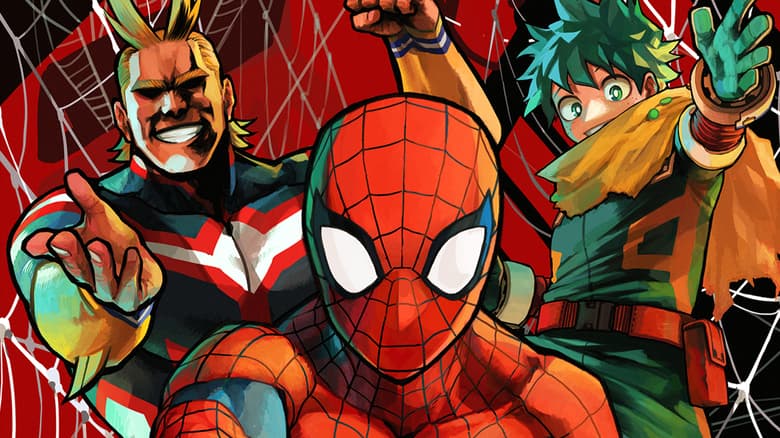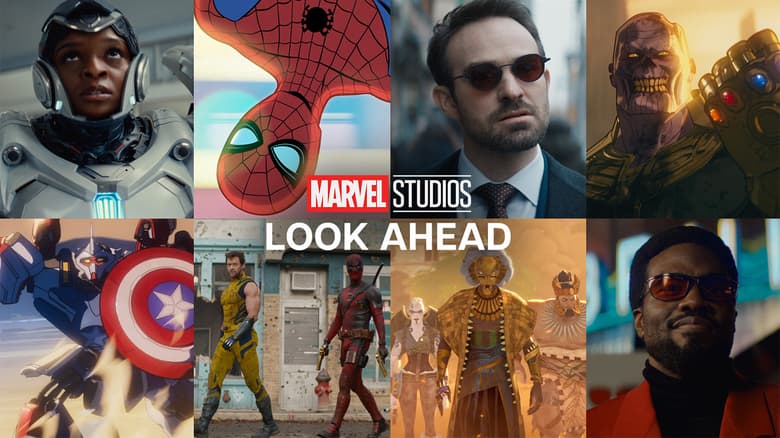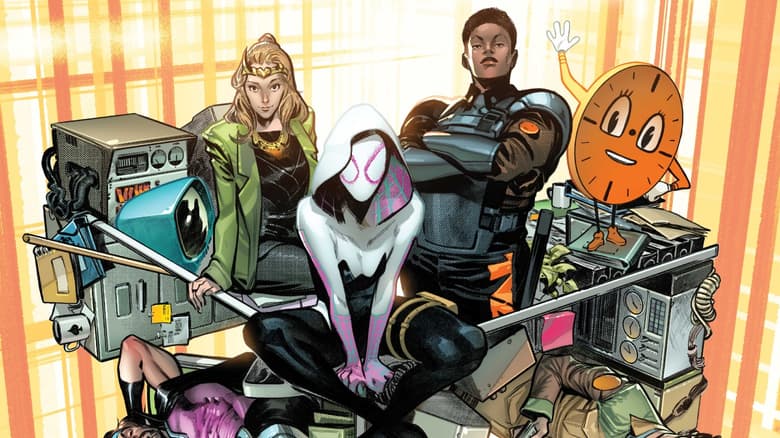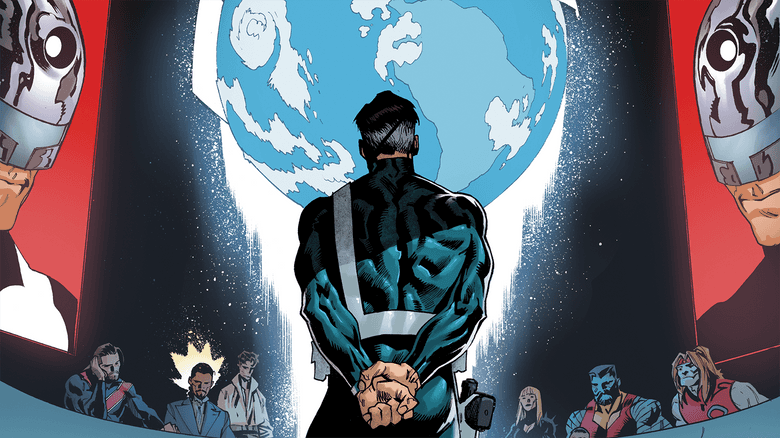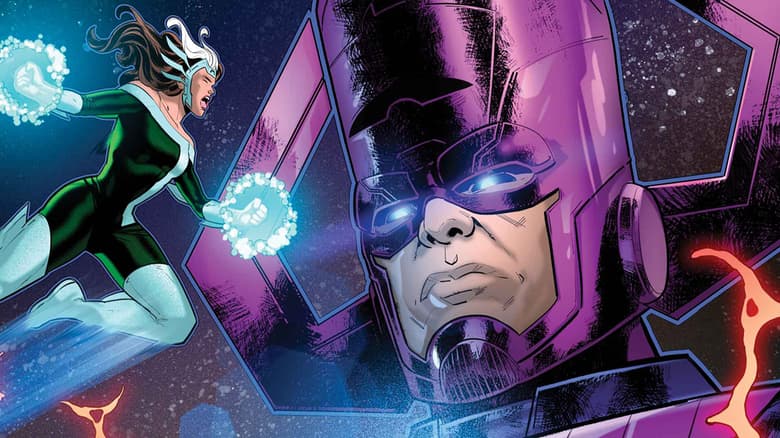Hulk: The Found Footage
Writer David Pepose talks about rediscovering the Green Goliath through the eyes of an intrepid group of documentarians in ‘Hulk Annual’ #1!
Sometimes out here in the real world, it feels like we’ve become too comfortable with the towering behemoth of emerald might known as the Hulk. You can find dolls of this force of nature—his likeness emblazoned on lunchboxes! But for residents of the Marvel Universe, Bruce Banner’s monstrous alter ego still strikes terror, something writer David Pepose hopes to remind us of in this month’s HULK ANNUAL #1.
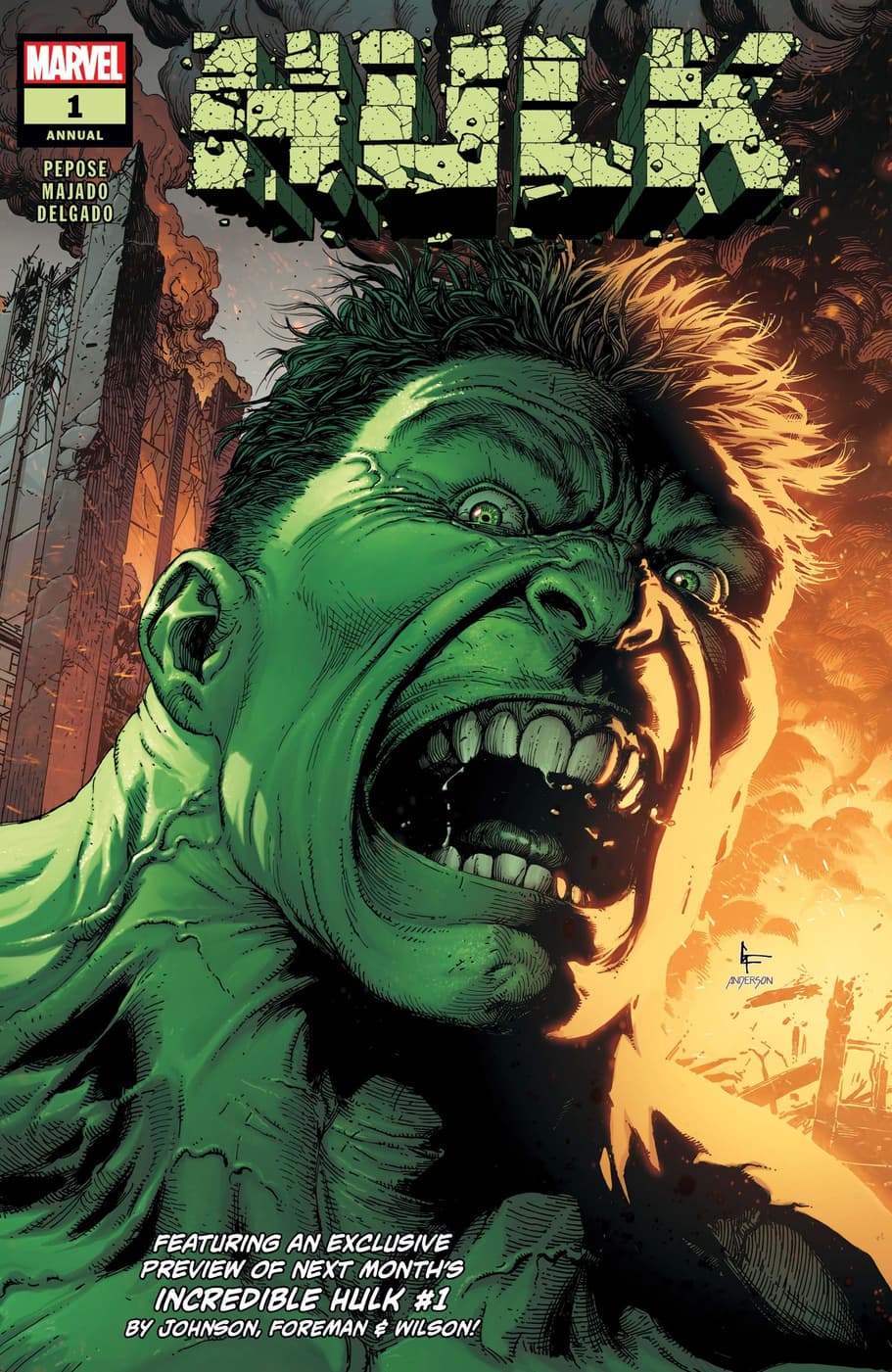
Pepose and artist Caio Majado, along with colorist Edgar Delgado and lettering legend Cory Petit, team up for a very special tale that finds an enterprising crew of documentary filmmakers pursuing the Green Goliath and getting much more than they bargained for. With Phillip Kennedy Johnson and Nic Klein’s INCREDIBLE HULK series launching in June (this Annual in fact includes an exclusive prologue for that series!), Pepose relished his opportunity to put a unique spin on the character.
We spoke with Pepose about his major influences, the origin of framing the story with a documentary, how Hulk works for horror and much more.
What’s your background with the Hulk as a reader and fan?
DAVID PEPOSE: When I was five or six years old, my parents got me hooked for life by giving me four Marvel Comics—AMAZING SPIDER-MAN (1963) #346, CAPTAIN AMERICA (1968) #384, SILVER SURFER (1987) #47 and most germane to this conversation, INCREDIBLE HULK (1962) #364. For those who don’t remember that comic, that involved Bruce Banner getting poisoned while battling the Abomination—and ending the fight by dousing him in toxic waste. That was the comic that scared me the most as a kid. [Laughs]
As an adult, I’ve been lucky enough to enjoy some of the seminal runs on the character, particularly Al Ewing’s IMMORTAL HULK, Greg Pak’s masterful run spanning “Planet Hulk,” “World War Hulk” and beyond, Peter David’s critically acclaimed 11-year tenure on the Hulk, Mark Waid’s genre-smashing INDESTRUCTIBLE HULK, even Mark Millar’s twisted Hulk origin in THE ULTIMATES. The Hulk is a lot like Daredevil, to me—he’s a character that inspires world-class talent to create some of the best stories of their careers.
But through it all, I think I’ve always viewed the Hulk as the ultimate larger-than-life figure in the Marvel Universe. I think the emotion of rage is one of the most blinding emotions of the human experience—trying to pierce through that feels like trying to gaze into the sun. It’s too powerful, it’s too intense… it’s unknowable, in a way. And I think that childhood fear is the biggest element that informed this story.
How were you approached about working on this HULK ANNUAL?
DAVID PEPOSE: I’d been talking with my editors Wil Moss and Michelle Marchese at the end of last year about potential projects to work on, and I was thrilled when Wil asked me to step in for this HULK ANNUAL. It felt like some big shoes to fill, coming after Donny Cates’ epic run and serving as the warm-up act before Phillip Kennedy Johnson’s new series—but Wil’s edited some of my favorite comic runs ranging from IMMORTAL HULK to VISION (2015) to Jason Aaron’s THOR, so I was really excited for the opportunity to work together.
Did you pitch the story or was the idea already there?
DAVID PEPOSE: Yes, this story was an original pitch of mine! Wil and Michelle gave me a lot of latitude as far as what kind of story I could tell with the Hulk, and I’d been wanting to do a found-footage comic for ages but hadn’t found the right angle. But when I was approached about coming up with a story for the Hulk, I realized this was the perfect place for it.
It all comes back to the inherent scariness I felt as a kid of a character as powerful and uncontrollable as the Hulk, where it becomes difficult to even look him in the eye. But by examining him and the ripple effects of his existence at a remove, through the lens of a camera? That feels like a story that honors the parts of the Hulk that resonate most with me—his immense, unstoppable power, coupled with his white-hot rage and uncontrollable fear.
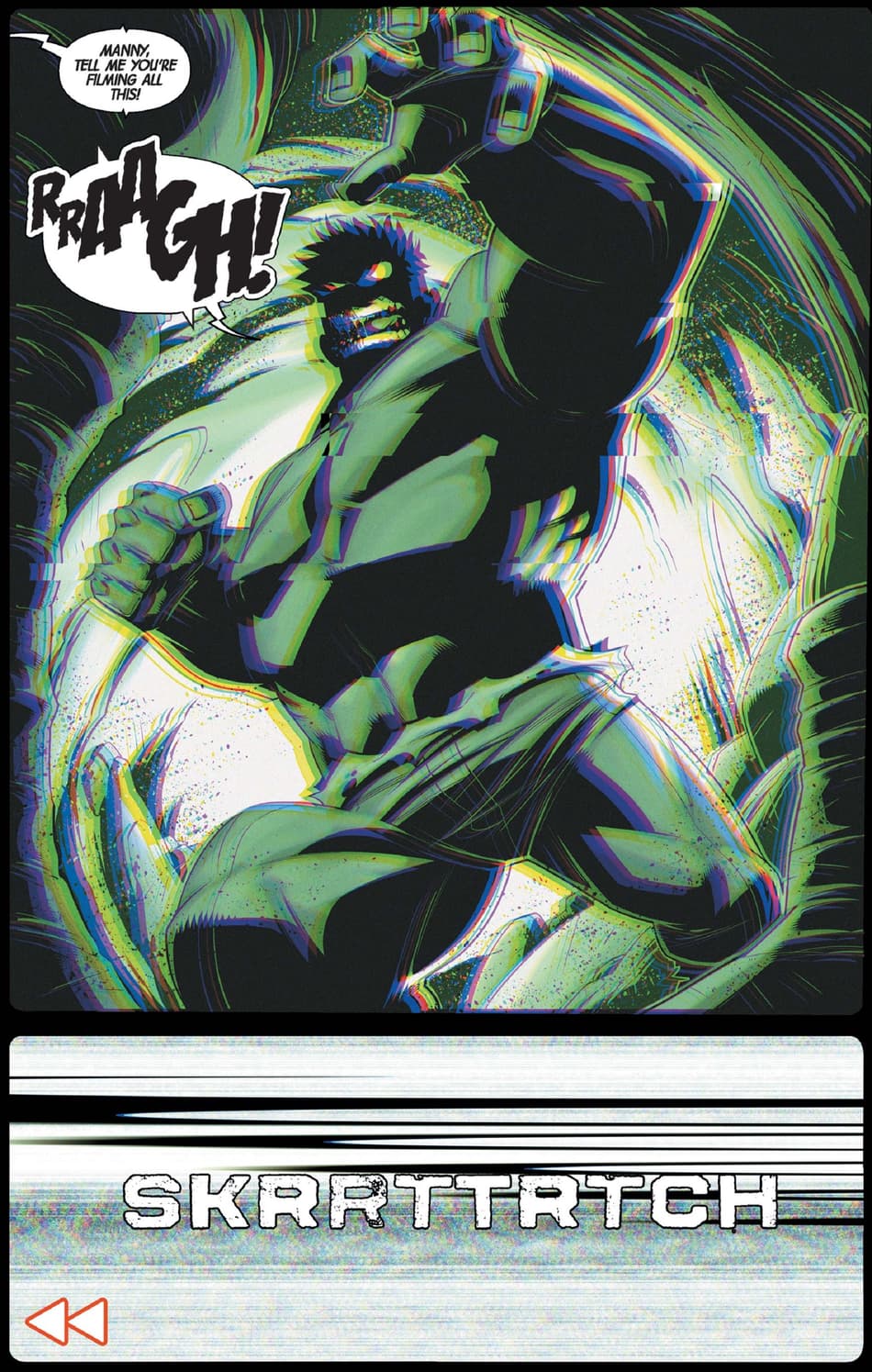
Why the decision to make a group of new characters the narrative focus of the story versus the Hulk himself?
DAVID PEPOSE: The Marvel Universe has always been the world outside your window, and I think the reason why is because of the inherent humanity not just in our super hero characters, but in the everyday civilians around them. It’s a conversation I’ve had regarding all my Marvel work to an extent—how do we remember to include normal human beings and human stakes in a world that’s otherwise so often defined by spectacle and the fantastic?
And I think that’s what makes this found-footage concept of this HULK ANNUAL so exciting; we get to explore the Hulk through those human eyes, from people who don’t know Bruce Banner as a person, but as this larger-than-life being—part historical figure, part celebrity, part urban legend, part natural disaster. You can’t have a world where the Hulk exists without consequences, some kind of ripple effect—and the self-contained nature of this Annual made it the perfect place to explore that kind of story strictly on its own terms.
How did you go about fleshing out these new characters so that we would care about them in under 30 pages? Was that challenging?
DAVID PEPOSE: It was really important for me to establish our cast of characters early, because I wanted them to feel three-dimensional and to give them a sense of personality that readers could invest in. Part of that was being as specific with their voices and characterization as I could, even from our opening pages. I also wanted to explore these characters through action—are they empathetic? Are they funny? Do they care about each other, or the people they’re interviewing? Do they step up when the chips are down? Or does their ambition run away with them?
Even the nature of this film crew’s job winds up being a critical question—can you explore and expose stories of human suffering without participating in it in some way? Can this film crew shine a light on the town of Viridian without further exploiting them? I’d like to think that these characters ultimately mean well, but that’s a thorny question we give our readers in this issue—maybe there are monsters on both sides of the camera here.
Where did the documentary angle come from?
DAVID PEPOSE: I’ve always loved playing around with structure and splicing different strains of pop culture into my work, and the idea of a found-footage comic has been on my agenda for a long time—but I think the documentary angle calls back to my time as a journalist in rural Massachusetts, where I covered a lot of stories in former industrial towns that were struggling to find a new direction.
In a lot of ways, this story was very much a love letter to my time finding stories as well as figuring out the ins-and-outs of video production—I love how scrappy reporters can be, and I think documentary filmmakers like the ones in our story represent that determination, resourcefulness, and perseverance beautifully. In a world where super-powers exist, I think those qualities might be some of my favorite human characteristics to explore.
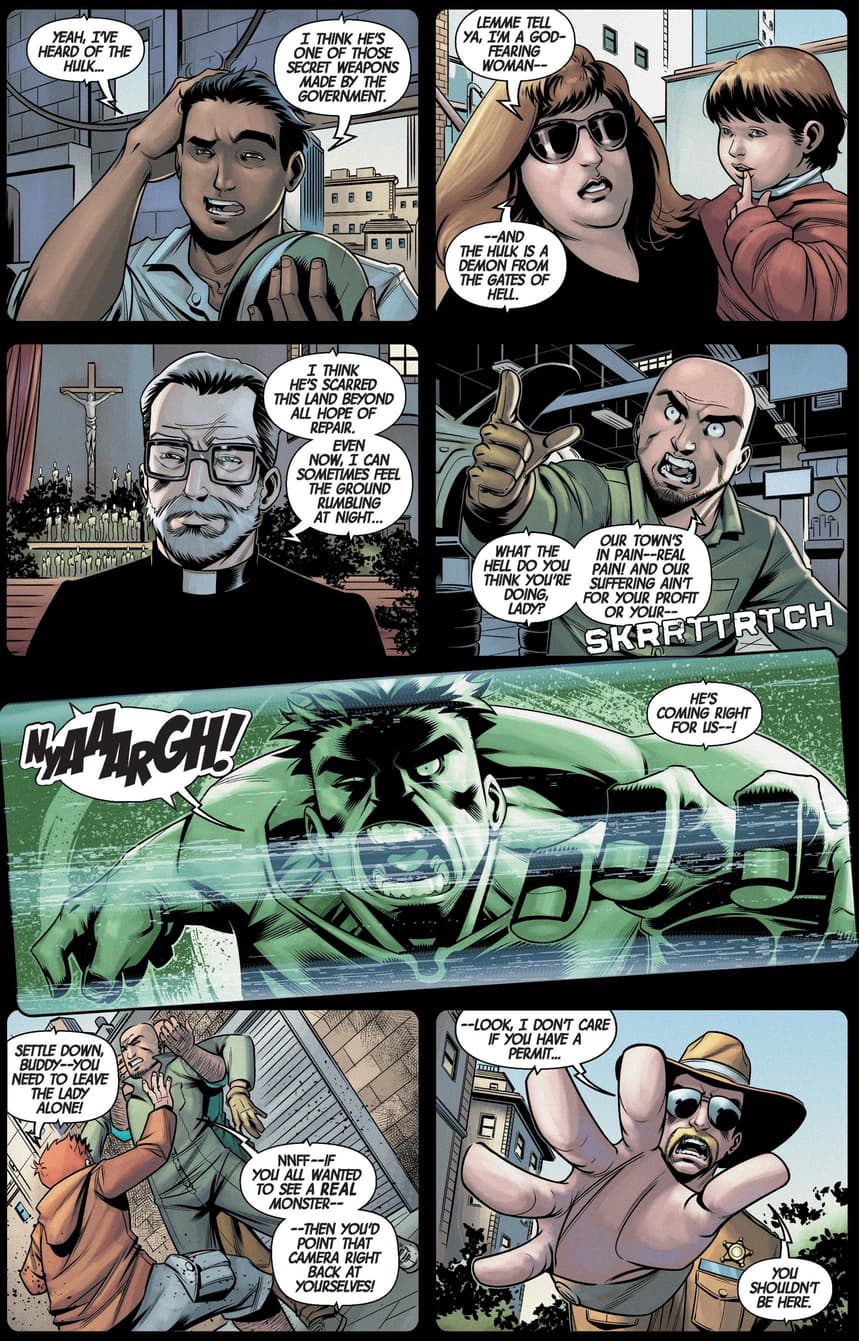
A lot of times, the Hulk works best when done as a type of horror character, and that feels true here with your story. How does that alter your approach to writing?
DAVID PEPOSE: I think it comes down to a sense of mood, especially in a story where we’re so deliberate about what the reader can and cannot see. The Hulk’s presence looms over this entire story whether he’s in the frame or not—it’s almost like a twister brewing, but one that affects both past and present. The town of Viridian looking back on the Hulk as this seismic change to their way of life I think only builds him up in the readers’ minds—and then when we finally see the Hulk cut loose, it’s through the lens of the destruction that our camera crew is trying their best to escape. We’re trying to do something visceral by restricting our readers’ sense of control—they’re in the thick of it just like our all-too-human protagonists, and not everybody will survive.
What past Hulk runs and stories did you try to echo here?
DAVID PEPOSE: IMMORTAL HULK was certainly a big influence, particularly the one-shots like “Time of Monsters” and “Flatline.” I also looked to the original Stan Lee and Jack Kirby issues for inspiration, since so much of this story mines those early settings. But even runs like Greg Pak’s were a big influence—"World War Hulk” in particular felt like a treatise on the sheer destruction a force like the Hulk can unleash, and that was something we wanted to explore on the ground with this story.
There’s a classic Marvel character besides Hulk who cameos in this issue—what can you say about their inclusion?
DAVID PEPOSE: Giganto! I love that character so much. While I’ve talked a lot about remembering the humanity in the Marvel Universe, I also happen to be a fan of giant monsters, and from Devil Dinosaur to the Tri-Sentinel to Ultimo, I try to fit them in my stories whenever possible. I contain multitudes. [Laughs]
Part of why I chose to use Giganto in this story was that I wanted to evoke the same feeling of larger-than-life spectacle of a Cloverfield, to give Hulk a worthy adversary in what essentially is a kaiju fight in a forgotten American town. There’s a lot of angles to Giganto that gave me some fun opportunities with this found-footage story, so he really was the perfect character to help push our film crew through different locations in this story.
But even thematically, I see Giganto as a similar figure to the Hulk, a misunderstood beast whose capacity for destruction often overshadows the deep wells of compassion each character deserves. I see them as two sides of the same coin, especially because Giganto lacks the agency that the Hulk does—Giganto always resonates to me the most as someone’s pet, and that dynamic really cuts to the heart of the moral ambiguity of this story. Giganto is a dangerous creature with real capacity for violence, absolutely no question—but is it really his fault?
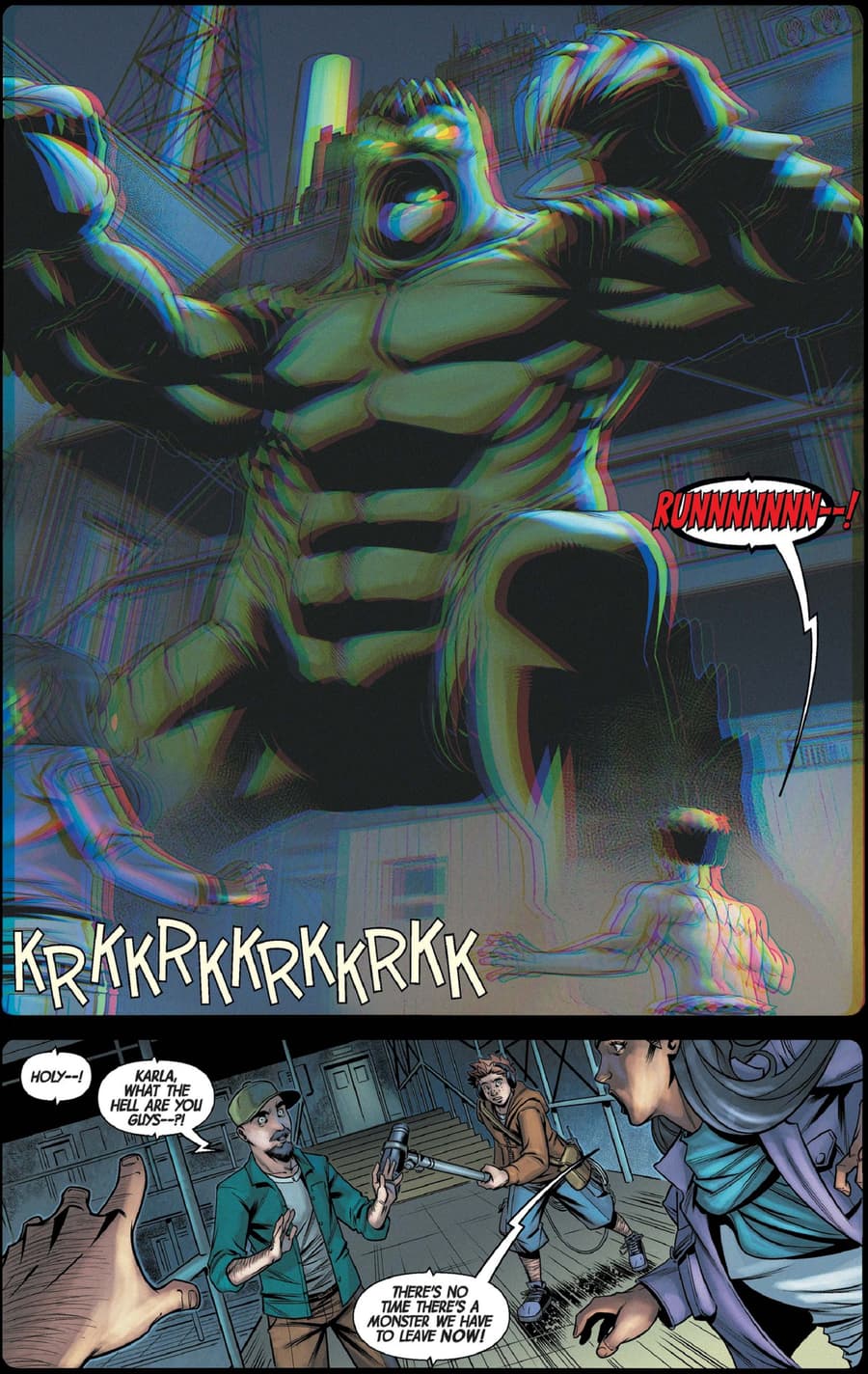
You worked with Caio Majado, Edgar Delgado and Cory Petit on this book—what was your collaboration like?
DAVID PEPOSE: This was such a technically challenging script, and I couldn’t be more grateful to Caio, Edgar and Cory for taking the ball and running with it like they did. I talked a lot about influences I’d brought to this storyline, but Caio and Edgar were instrumental in designing each character and making them feel like living, breathing figures. Caio in particular I asked a lot for this story, because every panel is another shot from the camera, and I think he left it all out on the field staying true to this unique point of view.
Edgar and Cory meanwhile added so much to the book, particularly the kinds of technical effects that would let a reader buy into this found-footage high concept—color glitches, lettering distortion, our ability to switch from night-vision to black-and-white, these were all in their hands, and I don’t think we’d be able to get readers to buy into this without them. This whole Annual feels like the epitome of a team effort to me, and I can’t thank my collaborators enough for committing to this vision with such skill and thoughtfulness.
What was your favorite part of working on this HULK ANNUAL?
DAVID PEPOSE: Being able to try something new—I had a lot of fun pushing what we could do with a standalone comic structurally and visually, but I also am happy with how we were able to push where this story could go. This is a story about forgotten towns, economic desolation, the environment, human greed and ambition… and it’s a story about the Hulk going toe-to-toe with an enemy that’s just as strong as he is. It feels different from anything I’ve written before, and I couldn’t be prouder of how this Annual has come together.
There’s a preview of Phillip Kennedy Johnson’s upcoming INCREDIBLE HULK with Nic Klein here—what are you looking forward to from their run?
DAVID PEPOSE: I can’t wait to pick up Phillip and Nic’s INCREDIBLE HULK—Philip’s a buddy of mine, and he’s not just one of the kindest people I’ve met in the comics industry, but also one of the most talented and heartfelt writers I know. He’s got some really fun stuff cooking for Bruce Banner and company, and given how incredible Nic Klein is as an artist, I have the feeling this book is going to look spectacular. Like I said, I think the Hulk is one of those characters that can really bring the best out of his creators, and I think this could be an all-timer of a run from Phillip and Nic.

